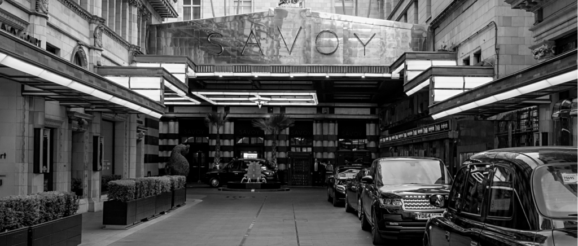Innovation in the supply chain in hospitality and leisure

On Thursday 23rd February, 4C Associates brought together leaders in hospitality and leisure for a breakfast panel discussion at London’s landmark, The Savoy hotel.
Whilst innovation in supply chains is always a topic for discussion, especially with regards to sustainability and data visibility, it was generally agreed the immediate focus should be on getting the basics right after the sector recovers from Brexit and the global pandemic. But once we’ve done that, what next…?
One of the themes of the discussion was the dilemma between collective and individual approaches to supply chain challenges. With sustainability being high on the agenda for many hospitality and leisure businesses, there is a need for third-party data and support for customers in tracking carbon emissions, which is dependent on collaboration and partnerships between customers and suppliers as we move towards net zero. Both data and disruptors in the industry play a significant part in keeping supply chains agile, as all panellists agreed that the ongoing impact of the pandemic continues to shake up supply chains in the sector.
There is an increased importance of innovation when it comes to fundamentals, such as the focus on on-time deliveries and providing customers with supplier data to understand details of any issues in their supply chain.
As one of the panellists shared, their custom-built cloud-based system gathers data from their supplier base and provides customers with a live view of data to a granular level, down to individual deliveries per supplier, which not only gives a transparent view to customers, but it also provides the business with insights to better serve their customers and improve their position in the industry.
Taking a customer perspective, their focus in supply chain innovation is on getting the basics working fully as we recover from Covid-19 and deal with the impact of Brexit, particularly as the events in the last few years have given customers a broader understanding of what supply chain is and what it means for them, the economy and the environment.
How has the industry changed in recent years?
Utilities, inflation, wage increases and challenges in recruitment and staff retention have been among the shared challenges throughout the panel. The significance of the labour shortage impacting the supply chain in the industry has been particularly challenging and as one of the panellists highlighted, addressing the labour shortage is going to be critical going forward and will need to be resolved in order to allow for real improvement in the next 25 years.
As customers today require and expect greater assurance in how their supply chain is working, there are benefits in providing customers with access to live data on their supply chain, in order for them to know what’s going on and how suppliers will fix any issues. There has also been a big increase in demand to hold stock due to greater fluctuation in customer demands, forecasts, and orders, as the panel highlighted the significance of the supply chain and successful deliveries in driving the conversion of the initial order to a larger ongoing customer relationship.
Whilst AI and machine learning help to improve the customer experience, from a customer perspective, innovation in terms of data should be a value add rather than technically or aesthetically impressive. The experience across the audience was that Covid has pushed technology forward, however, it’s the technology of convenience and there is a need to meet in the middle if we are to fix issues created by Covid-19 and push for a broader innovation.
How do customers deal with challenges around the predictability of demand?
As highlighted by one of the panellists, proactive thinking around the substitution of products and accepting alternatives can help cover issues. So is accepting that forecasting from customers is more iterative now and to work with changes more than what was standard pre-Covid. There is a potential space for machine learning in forecasting, as a combination of data and human input to predict requirements, as suggested by the panel.
The consensus from the panel was that the future of the industry needs seamless customer experience, as well as addressing challenges around sustainability goals such as implementing electric vehicles. Could Amazon-style automated picking be used more broadly?, has been one of the questions raised. It seems difficult to imagine at the moment, however, this could change over time according to the audience.
With a track record of successful change management across hospitality and leisure, 4C Associates is acutely aware of the intricate challenges faced by food, drink, accommodation & leisure-related businesses. Please contact Gavin Bowen-Ashwin, Managing Partner and Head of Hospitality and Leisure at 4C Associates to discuss how you can overcome your challenges by future-proofing your operating model, streamlining your supply bases, enacting strategic partnerships, and fundamentally increasing your operational resilience.
The post Innovation in the supply chain in hospitality and leisure appeared first on 4C Associates.
